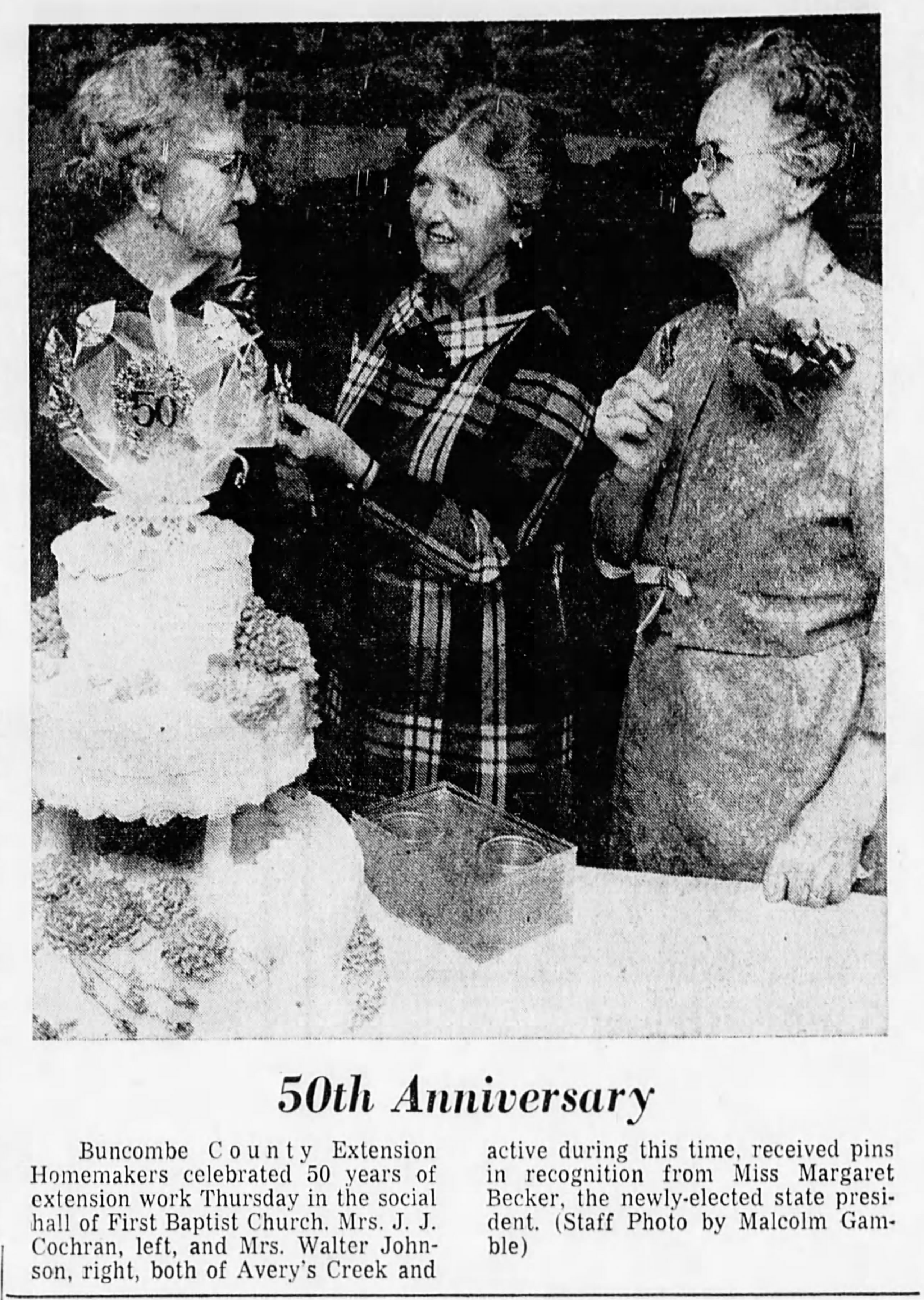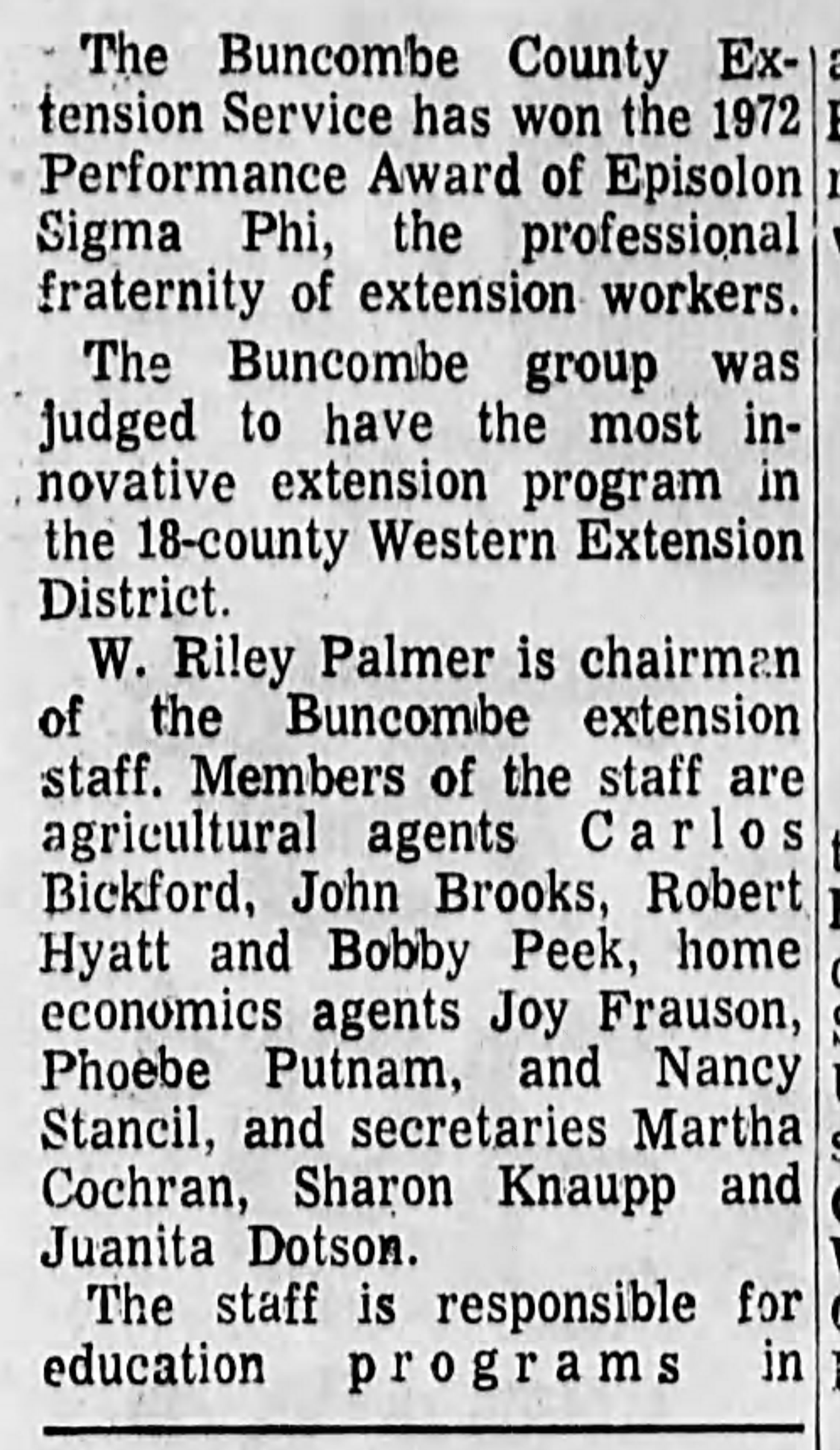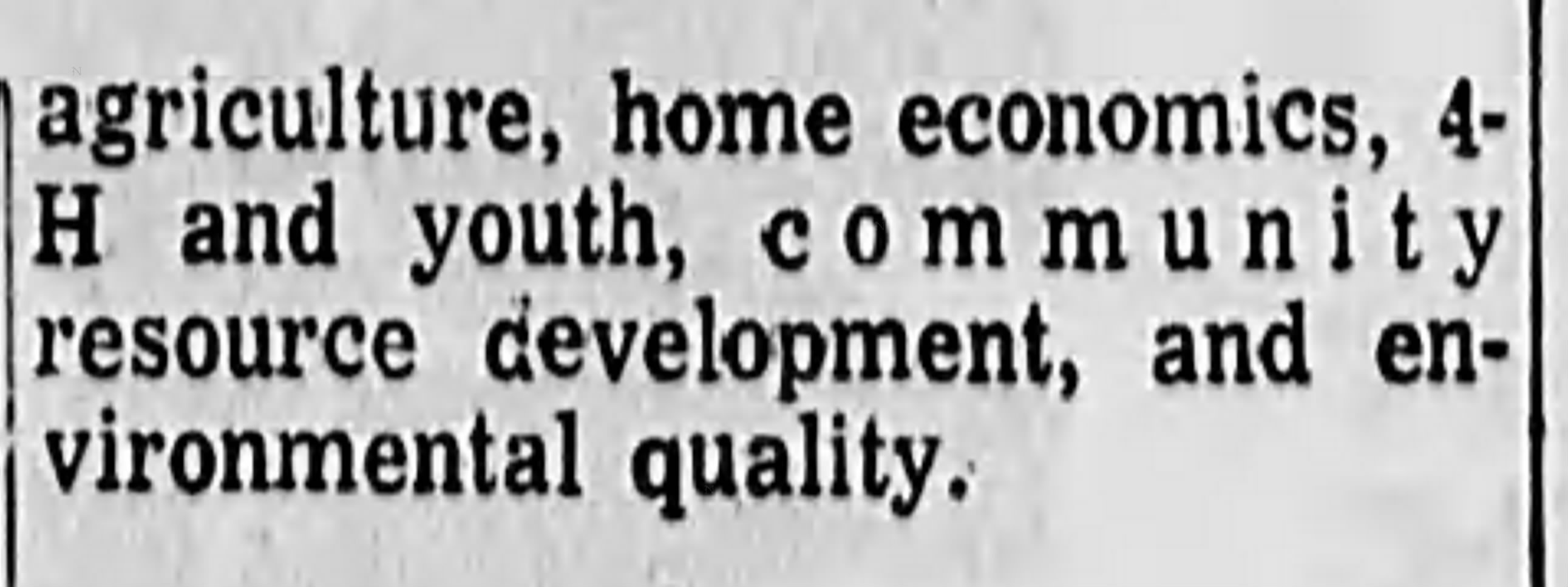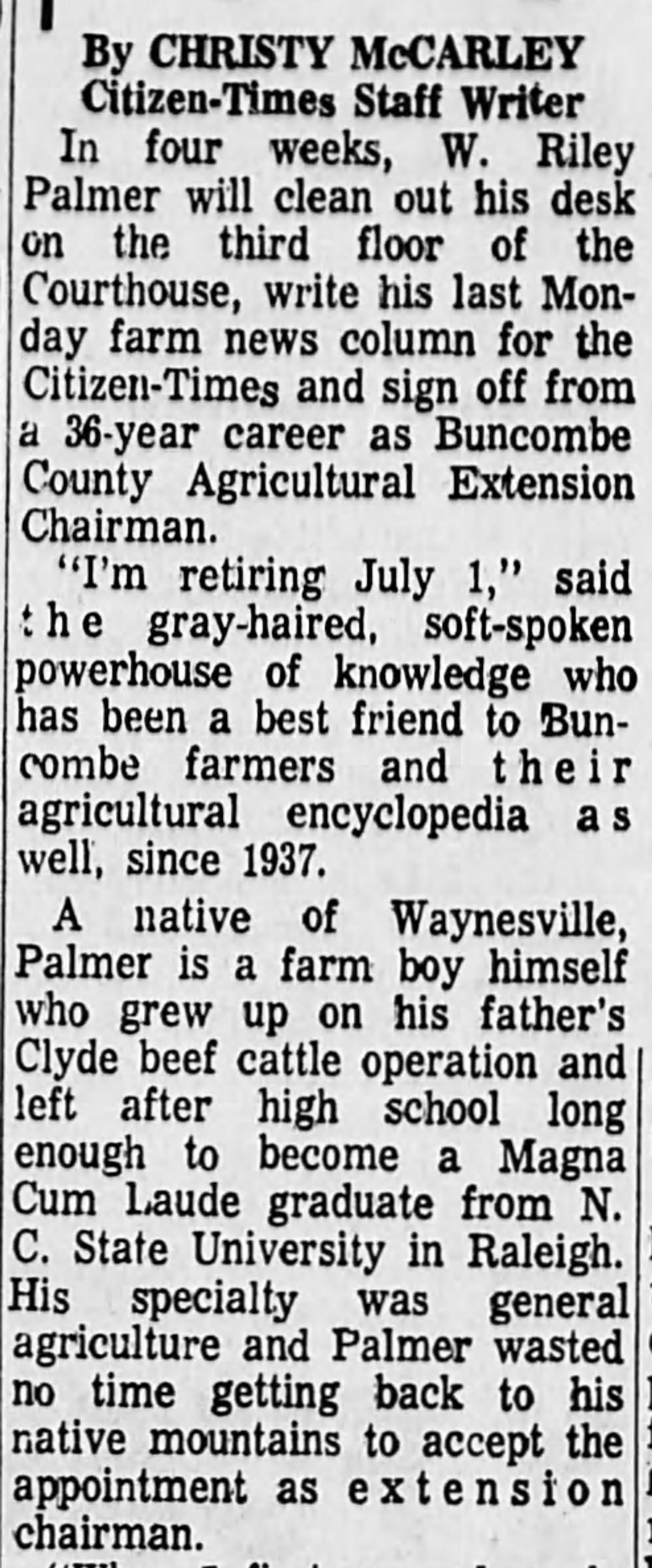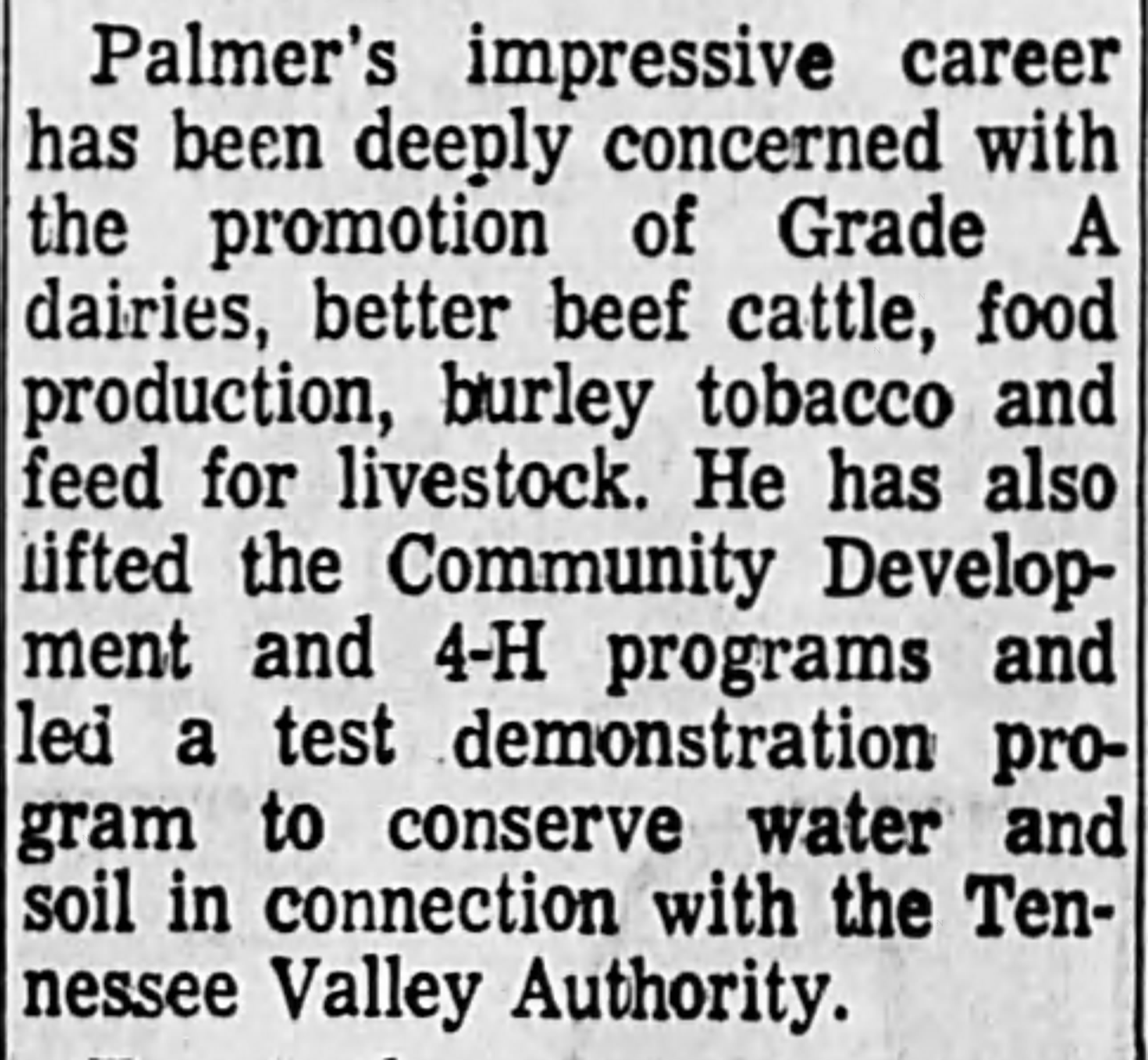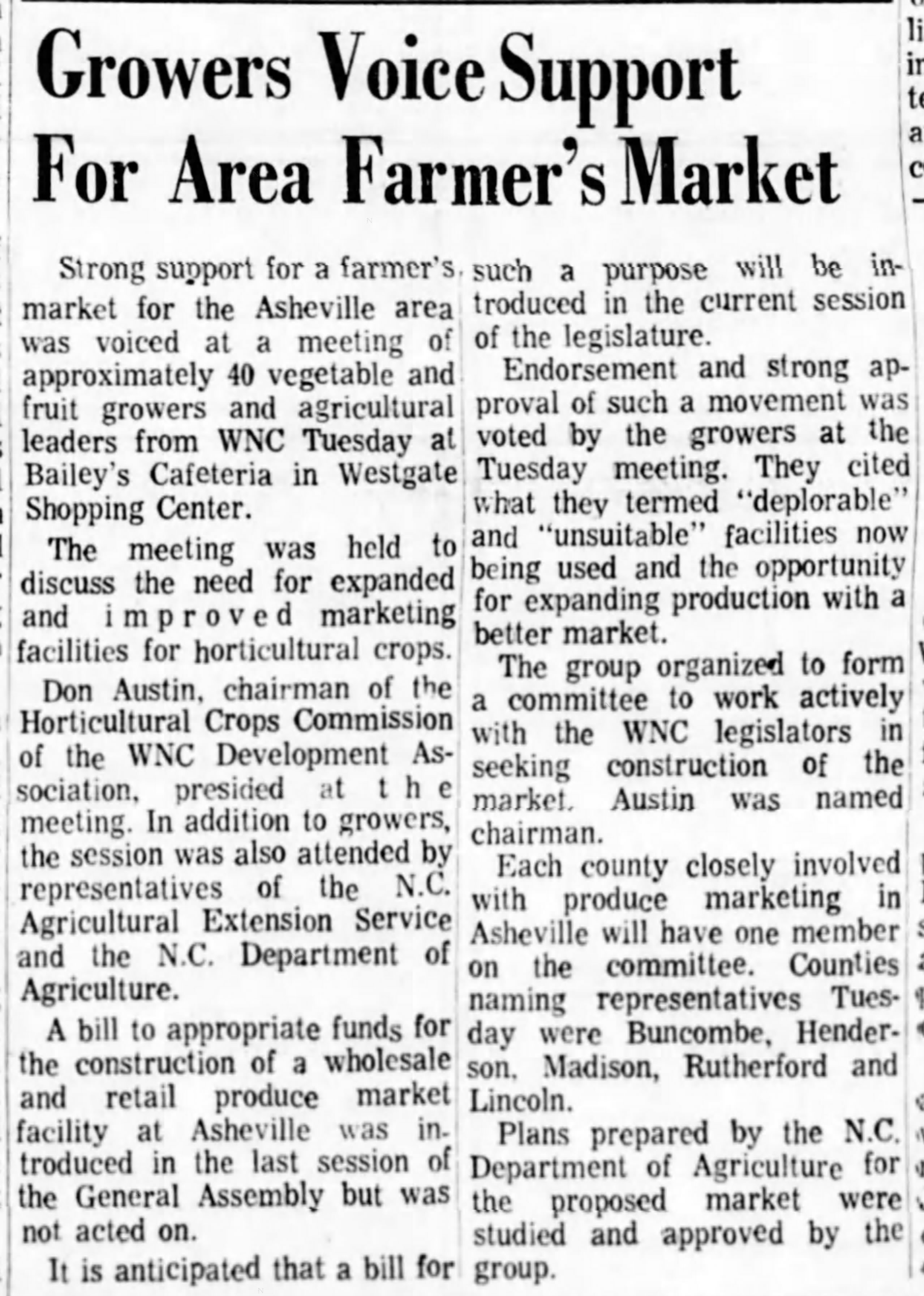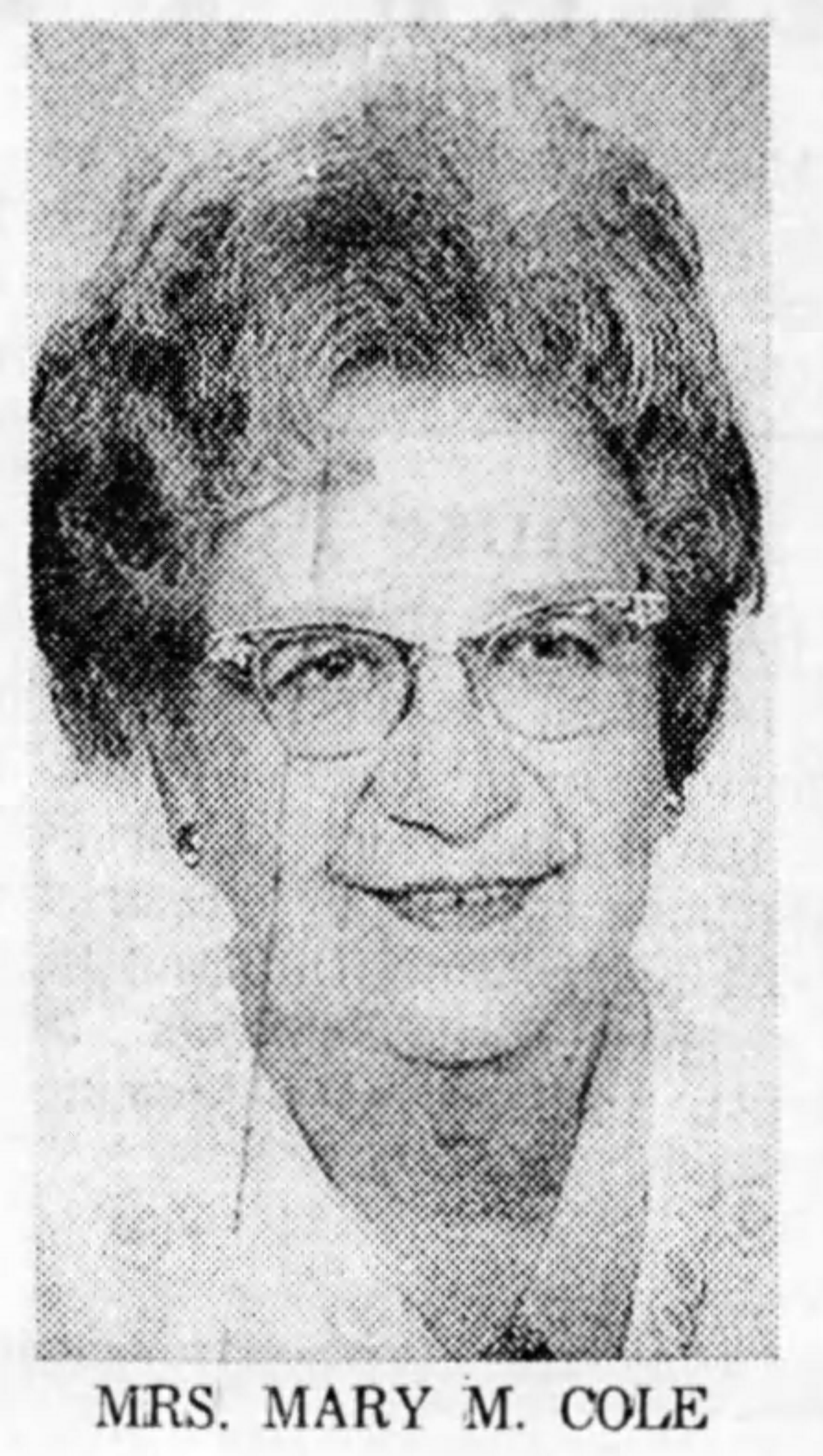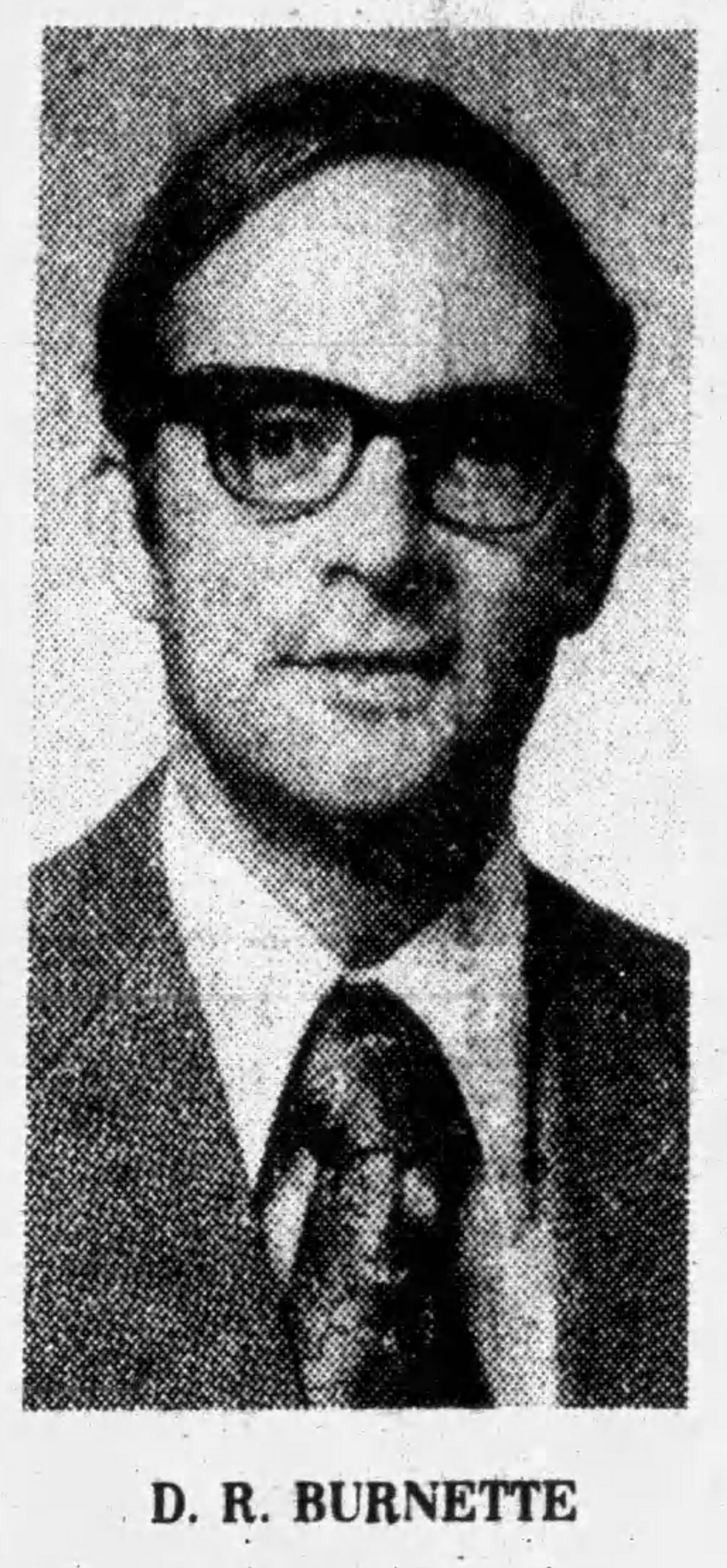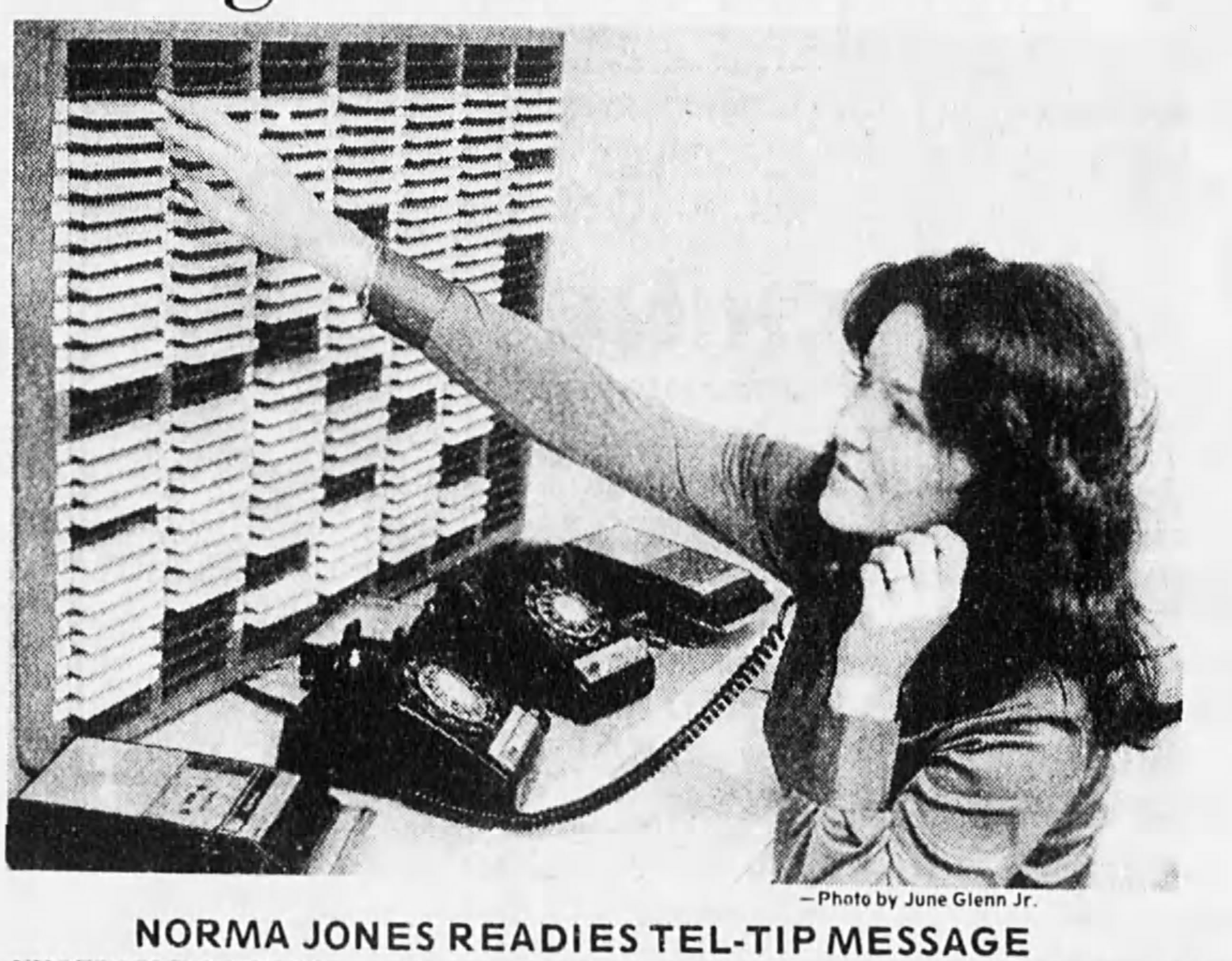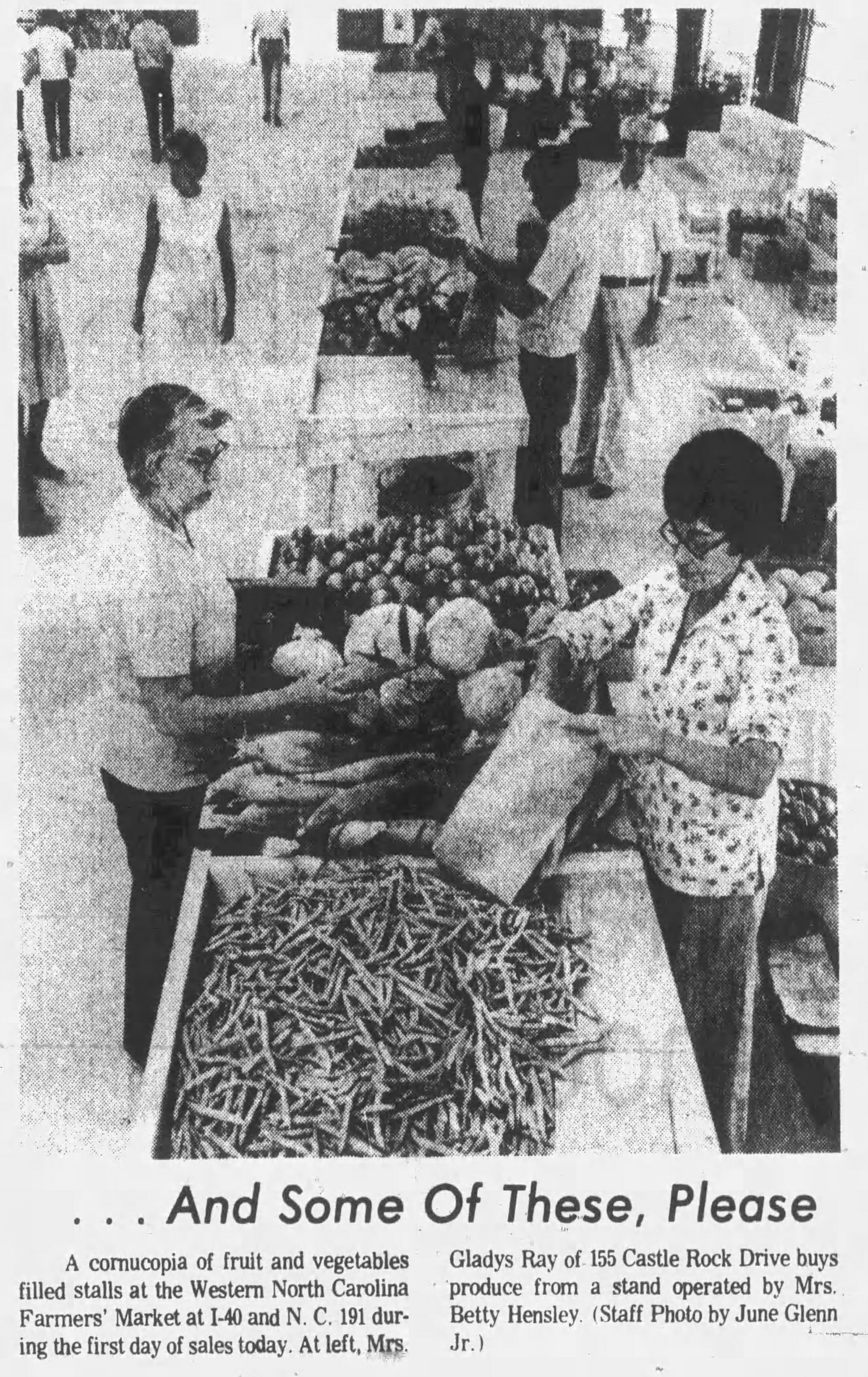Buncombe County Cooperative Extension : The 1970s
go.ncsu.edu/readext?1078005
en Español / em Português
El inglés es el idioma de control de esta página. En la medida en que haya algún conflicto entre la traducción al inglés y la traducción, el inglés prevalece.
Al hacer clic en el enlace de traducción se activa un servicio de traducción gratuito para convertir la página al español. Al igual que con cualquier traducción por Internet, la conversión no es sensible al contexto y puede que no traduzca el texto en su significado original. NC State Extension no garantiza la exactitud del texto traducido. Por favor, tenga en cuenta que algunas aplicaciones y/o servicios pueden no funcionar como se espera cuando se traducen.
Português
Inglês é o idioma de controle desta página. Na medida que haja algum conflito entre o texto original em Inglês e a tradução, o Inglês prevalece.
Ao clicar no link de tradução, um serviço gratuito de tradução será ativado para converter a página para o Português. Como em qualquer tradução pela internet, a conversão não é sensivel ao contexto e pode não ocorrer a tradução para o significado orginal. O serviço de Extensão da Carolina do Norte (NC State Extension) não garante a exatidão do texto traduzido. Por favor, observe que algumas funções ou serviços podem não funcionar como esperado após a tradução.
English
English is the controlling language of this page. To the extent there is any conflict between the English text and the translation, English controls.
Clicking on the translation link activates a free translation service to convert the page to Spanish. As with any Internet translation, the conversion is not context-sensitive and may not translate the text to its original meaning. NC State Extension does not guarantee the accuracy of the translated text. Please note that some applications and/or services may not function as expected when translated.
Collapse ▲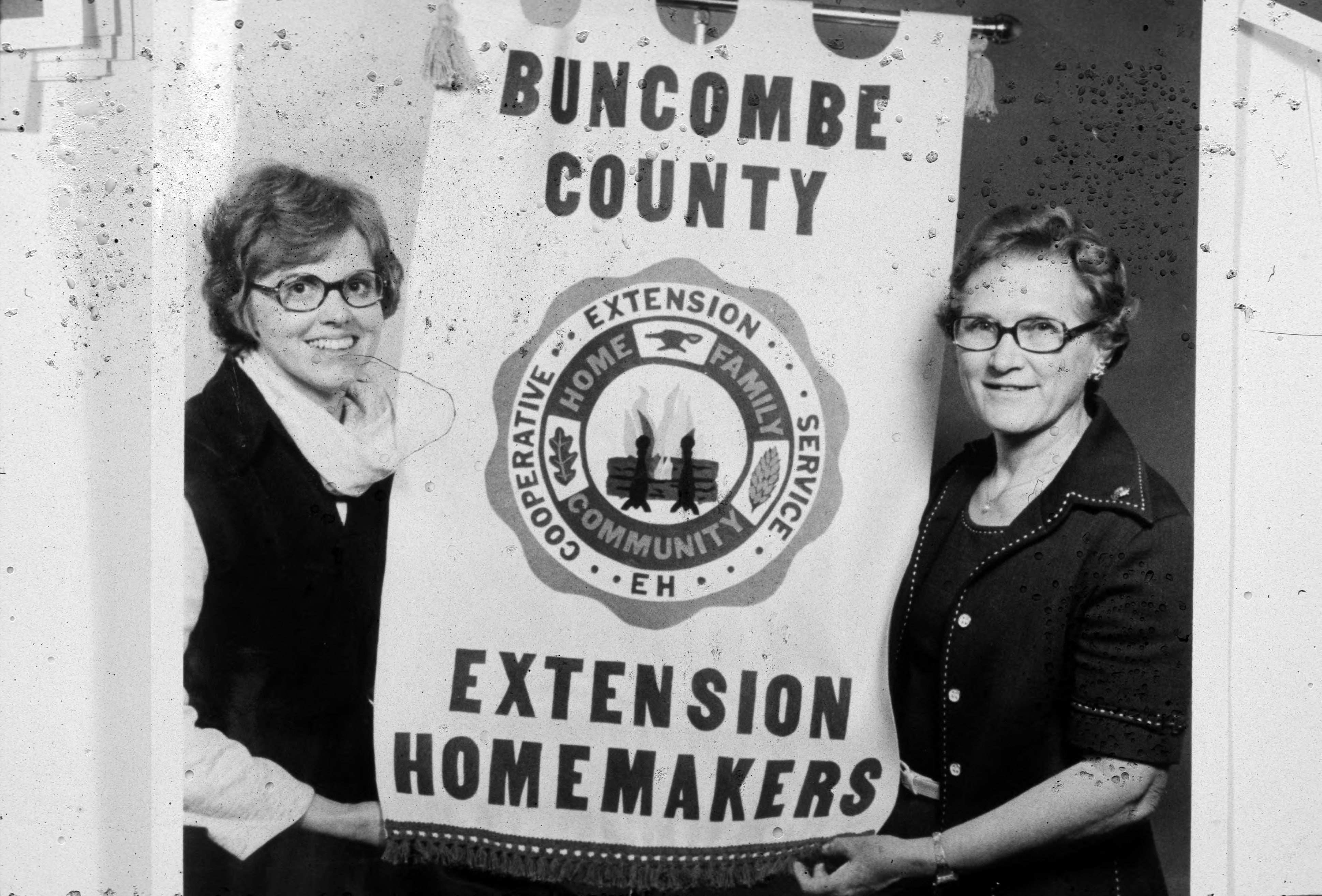
University Archives Photograph Collection. Home Demonstration Work (UA023.009), Special Collections Research Center at NC State University Libraries
The 1970s was a decade marked by turbulent changes in the political world, anti-Vietnam War protests, gas shortages, and economic inflation. At the beginning of 1970, Richard Nixon was president of the United States. A gallon of gas cost 36 cents, a brand-new car cost about $3,500, and the country’s population was just over 200 million.
The Watergate scandal brought major attention to the world of politics in 1972, when a group of men were arrested for breaking into the Democratic National Committee headquarters in Washington, D.C. They had wiretapped the phones and had stolen documents. They were later discovered to be involved in the re-election committee of president Richard Nixon. Nixon denied any knowledge of the men or their crimes.
On October 10, 1973, Vice President Spiro Agnew resigned from office after being charged with tax evasion. House Minority Leader Gerald Ford became Vice President. He served this role until August 9, 1974, Nixon’s resignation, when he became President of the United States. Gerald Ford continues to be the only person to serve as both vice president and president without being elected to either office.
A major advancement in technology occurred on April 3, 1973 when the first cell phone call was made in New York City. Motorola engineer Martin Cooper called his competitor, Joel Engel, of AT&T on his 2 1/2-pound cell phone. The phone was capable of working for 35 minutes after being charged for 10 hours.
1975 saw the long-awaited end of the Vietnam War when, on April 30, 1975, South Vietnam surrendered to the northern invaders during the Fall of Saigon.
1976 was a presidential election year and also the country’s 200th bicentennial. Celebrations took place around the country, and in November of that year Jimmy Carter, the governor of Georgia and former peanut farmer, won the presidential election over incumbent Gerald Ford.
On November 4, 1979, fifty-two American diplomats were taken hostage by a group of Iranian college students at the U.S. Embassy in Iran. President Carter was unable to diplomatically end the crisis, and a failed military mission left eight American service members killed with no hostages released. The standoff lasted 444 days and ended just minutes after the inauguration of President Ronald Reagan on January 20, 1981. Known as the Iran Hostage Crisis, its effects were far-reaching and caused decades of mistrust between the United States and Iranian governments.
1970
The 1970 Agricultural Census for Buncombe County lists:
208,299 acres (approximately 50% of the county) in farm tracts.
Of these acres, 15% is used for harvested crops.
15% for improved pasture.
14% for unimproved pasture.
5% is idle cropland.
51% is woodland, waste, etc.
The 2022 census lists 78,245 acres (approximately 18% of the county) in farmland.
View the most recent NC Census of Agriculture here: 2022 NC Census of Agriculture
October – The Buncombe County Extension Homemakers celebrate their group’s 50th anniversary.
1971
October – Milk dominates agricultural production in Buncombe County. With 95 “Grade A” dairies in the county, and twelve manufactured milk producers, the commodity brings in approximately $4.5 million dollars ($35 million in 2025 values). Burley tobacco ranks second, with 1,250 acres generating approximately $2 million dollars ($15 million in today’s values) for the local economy.
1972
March 20
June – Buncombe County Cooperative Extension receives a new telephone number: 704-255-5522.
When area codes were established in 1947, the 704 area code covered all of North Carolina. In 1954, the 919 area code was created, serving eastern and central North Carolina. The 704 area code remained in use for Charlotte and all points west until March 22, 1998, when the current 828 area code went into effect.
Buncombe County Cooperative Extension’s telephone number is still 828-255-5522 and we welcome your calls from 8 a.m. – 5 p.m. Monday through Friday.
November – Buncombe County Extension Homemakers decorate the Governor’s Western Residence for Christmas.
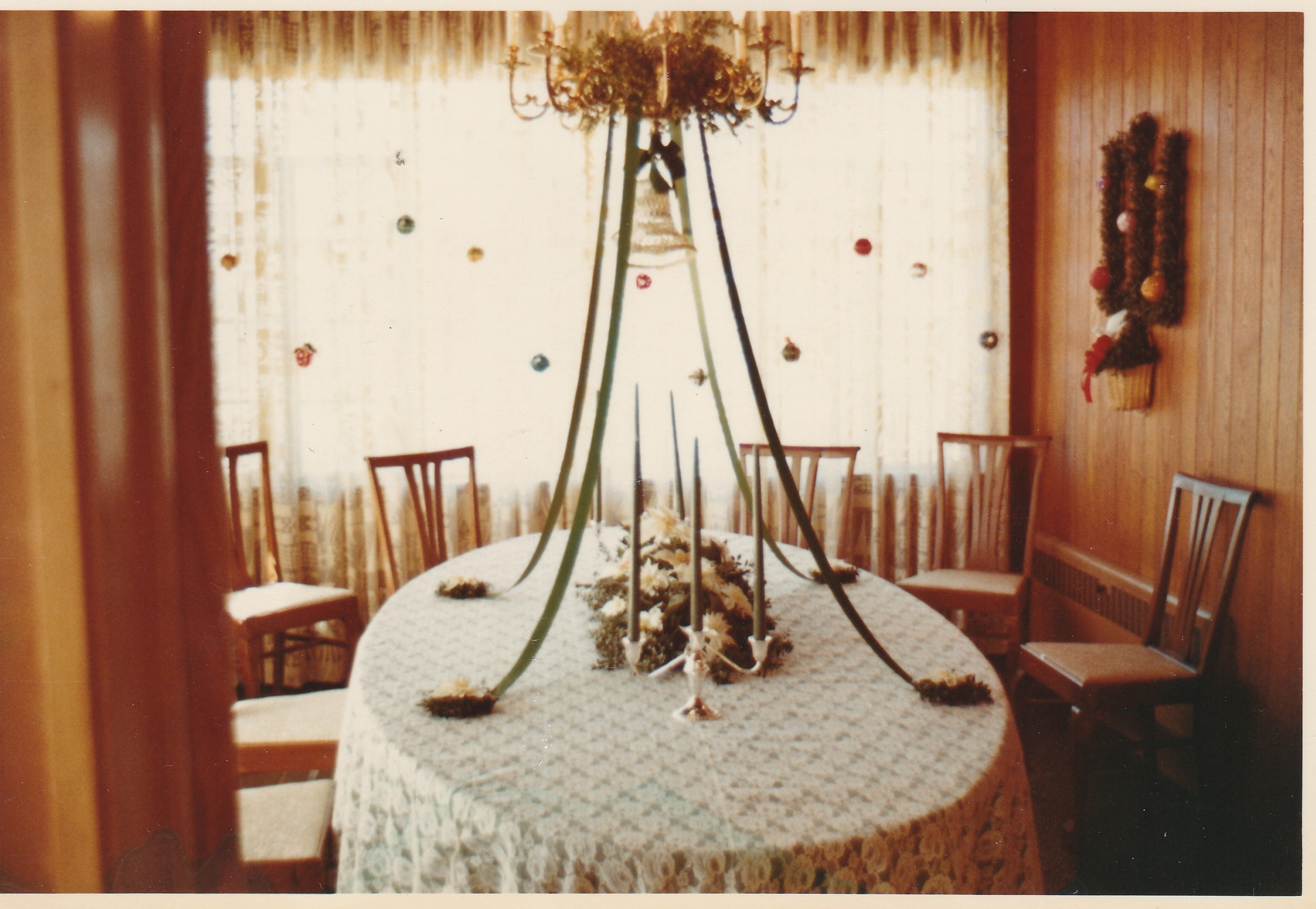
Governor’s Western Residence decorated by Buncombe County Extension Homemakers, 1972.
Photo courtesy Buncombe County Cooperative Extension.
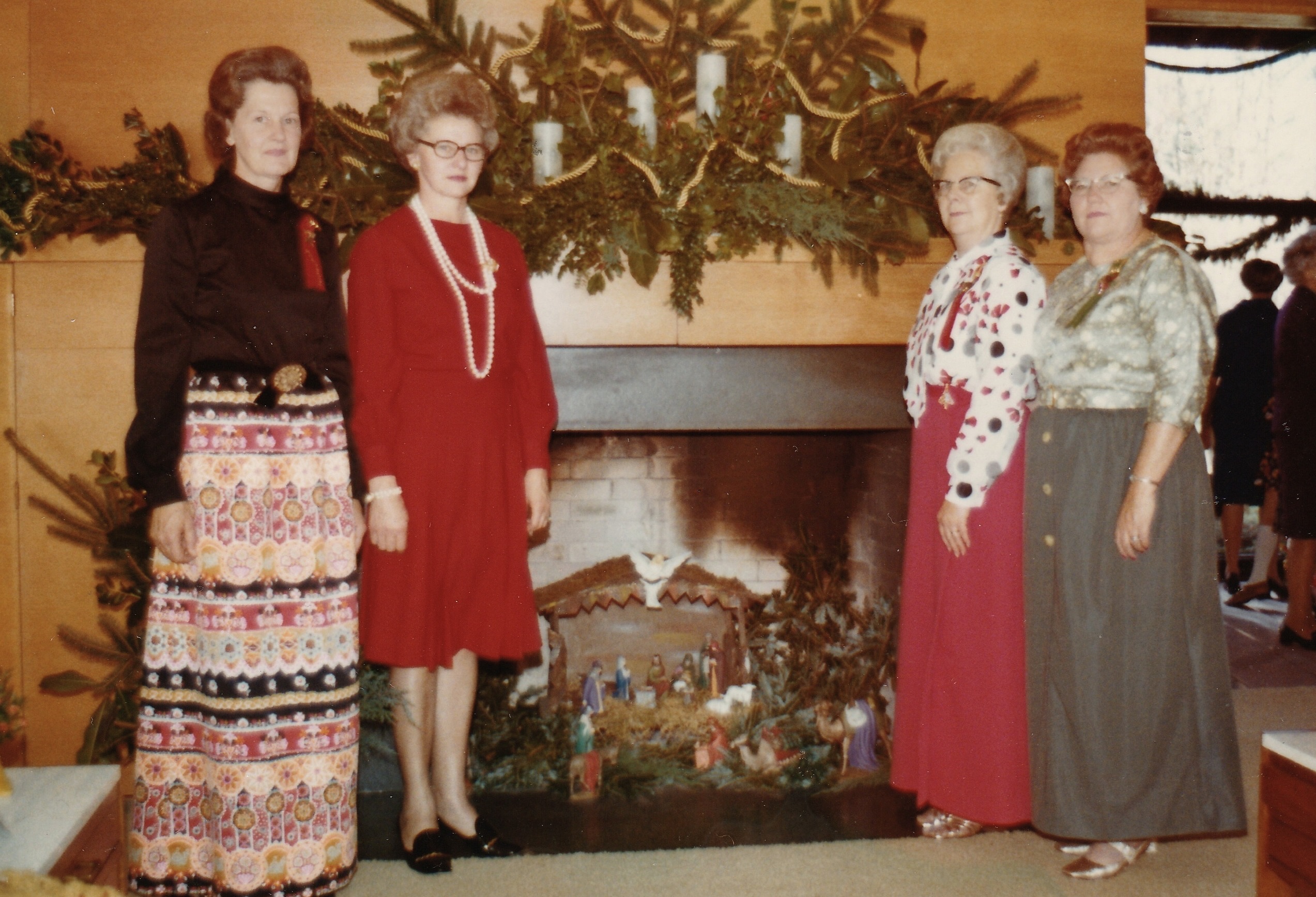
Left to Right: Genevieve Morris, Nancy Stancil (Buncombe County Home Economics Agent), Celestine Rhodarmer, and Mary West.
Members of the Extension Homemakers clubs.
Photo courtesy of Buncombe County Cooperative Extension.
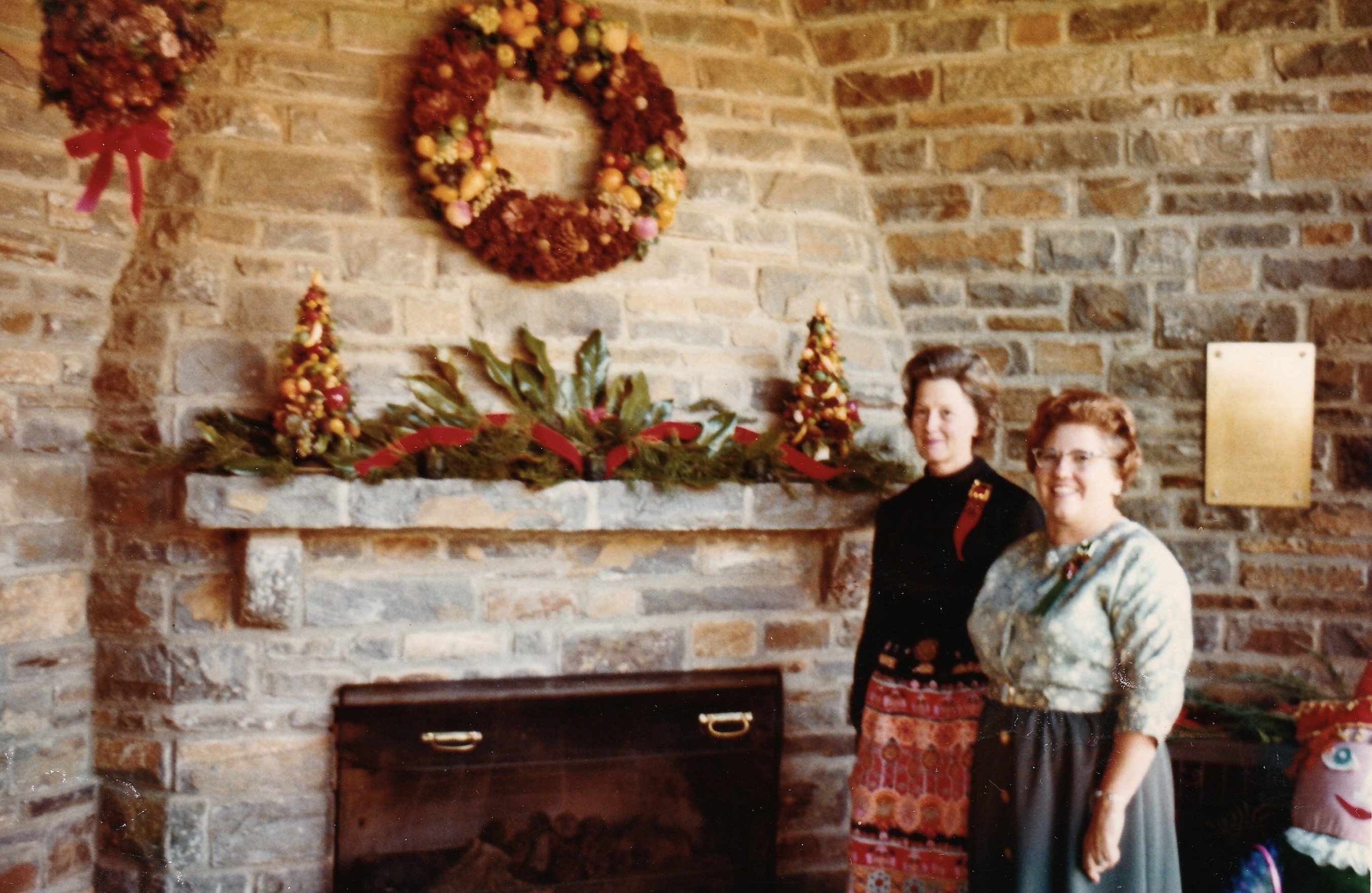
Left to Right: Genevieve Morris and Mary West.
Photo courtesy of Buncombe County Cooperative Extension.
1973
The North Carolina General Assembly enacts the Present Use Value (PUV) tax program in an effort to assist agricultural, horticultural, and forestry landowners of the state. Prior to 1973, North Carolina law required that all property be taxed at 100% of its market value. As development pressure grew, so too did the market value of land, to the point where it became impossible for some farmers and forestry landowners to continue to profit from farming.
Administered by the Buncombe County Tax Department, more information on the PUV tax program can be found here : Buncombe County Tax Department
July 1 – W. Riley Palmer, Buncombe County Extension Director, retires after 36 years of service.
Robert (Bob) Hyatt serves as interim Extension Director after Palmer’s retirement.
November 23 – Margaret Decker, of Asheville, becomes the first woman to serve as North Carolina’s State Chairman of Farm-City Week. This annual celebration and observance of rural and urban citizens working together in support of agriculture, began in 1955. In a tradition that continues today, each year National Farm City Week is proclaimed by the President as being the week leading up to and including Thanksgiving Day.
1974
January 22
July 17 – Mary Cole, Buncombe County Cooperative Extension secretary, announces her retirement after 28 years of service.
A native of New York, she married Andrew Jackson Cole, a stonemason, of Asheville and began her career with Extension in 1946. She was involved in organizing the Buncombe County Farm Bureau, the Buncombe County Breeders Association, the Buncombe County Dairy Herd Improvement Association and worked with many 4-H clubs.
1975
July 2 – It is announced at a luncheon held at the S&W Cafeteria at the Asheville Mall that a 20 acre tract of land was purchased from the Biltmore Estate and will be the location of the new $1 million Western North Carolina Farmers Market.
The purchase of the site received approval from the NC Council of State, a decision that followed a study by a site selection committee chaired by Morris McGough of the WNC Development Association.
July 16 – David Burnette is hired as Buncombe County Extension Chairman, filling the office of W. Riley Palmer, who retired in 1973.
A native of Swain County, David Burnette grew up in a farming family. In 1963 he graduated from Berry College near Rome, Georgia, with a degree in agriculture business. Prior to working in Buncombe County, Burnette worked with Mitchell County and Burke County Cooperative Extension offices. In 1980, he left Buncombe County Extension to work as the Western District Extension Director, a position he held until his retirement in 1993.
1976
May 18 – Cooperative Extension implements the “Tel-Tip” information service.
By calling Tel-Tip, users could choose from 142 options and hear a two-minute taped answer to commonly asked questions. Topics covered in the directory included fruit and vegetable gardening, insect and disease management, harvesting, and information on various preservation methods such as canning, drying, freezing, and pickling produce.
1977
January 4 – Buncombe County Cooperative Extension relocates their offices from the third floor of the courthouse, where they had been since 1927 when construction of the courthouse was completed, to the newly opened Allen Center.
The Allen Center was previously known as Allen High School and was founded in 1887 by the Woman’s Home Missionary Society of the Methodist Episcopal Church. Methodist Episcopal missionaries Dr. and Mrs. LM Pease established the school on property near Beaucatcher Mountain in Asheville. It opened in October, 1887 with Reverend NS Albright and Miss Alsie Dole as teachers. Subjects taught included writing, reading, and industrial skills like sewing.
Initially serving both boys and girls, it transitioned to a predominantly African American girls boarding school in 1892. The school was named after Mrs. Marriage Allen of England, who, during a tour of the southeastern United States, was so impressed by the work of the school that she financially contributed to the construction of the boarding house, which was completed in 1897. Boys and girls continued to attend the school until 1941, when it changed its name to Allen High School and became exclusively for girls.
Allen School graduated its first class in 1899 and its last on June 3, 1974 before closing after 87 years. Following its closure, the Methodist Church retained ownership, and the building was repurposed to house offices for agencies supporting children and young people of the Asheville area.
September 1 – The WNC Farmers Market opens on Brevard Road.
Originally encompassing 20 acres of land purchased from the Biltmore Estate, today the WNC Farmers Market consists of 36 acres. The site features two retail buildings along with Jesse Israel & Sons garden center and nursery. In addition, there are five truck sheds open to both retail and wholesale customers. Truck Shed 1 is dedicated to selling only products from North Carolina farmers and growers. The market also hosts wholesale suppliers, the WNC Foodworks commercial kitchen, and the Moose Cafe.
The agricultural economy of Buncombe County has been shaped by various markets throughout our region’s history. One early example is the City Market that was located in the 1892-1926 Asheville City Hall building. In the photo below, Bert Calahan, from Wolf Laurel, Madison County, sells apples outside the market. Notice the “Entrance to Market” sign above the archway at left in the photo.
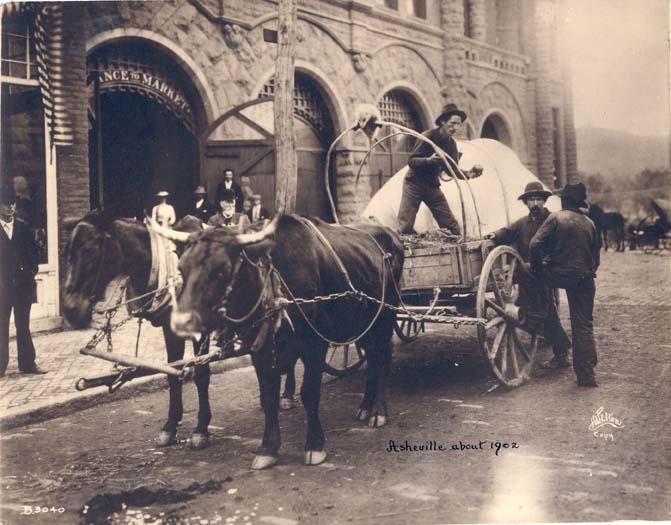
Bert Calahan (from Wolf Laurel) selling apples from his wagon in front of City Hall (1892) and Market.
Date of photo ca 1902.
Photo courtesy of Buncombe County Special Collections, Pack Memorial Public Library, Asheville, North Carolina.
Asheville farmer Benjamin James Jackson was born in Spartanburg, South Carolina, in May, 1866. In 1898, he established BJ Jackson Vegetable Market in Asheville’s City Market, notably the only African American owned business in the market. Jackson died December 17, 1924 from a heart condition at age 58.
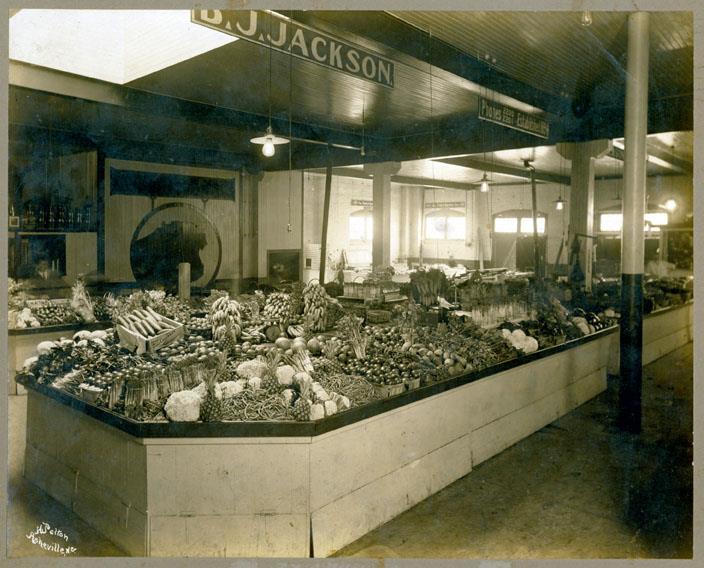
“BJ Jackson Vegetable Market, Asheville City Market.
Photo courtesy of Buncombe County Special Collections, Pack Memorial Public Library, Asheville, North Carolina.
The well known Lexington Avenue Curb Market began as a Works Progress Administration project in the early 1930s. Located in downtown Asheville on north Lexington Avenue at Hiawassee Street, the open air market served the community until the 1970s.
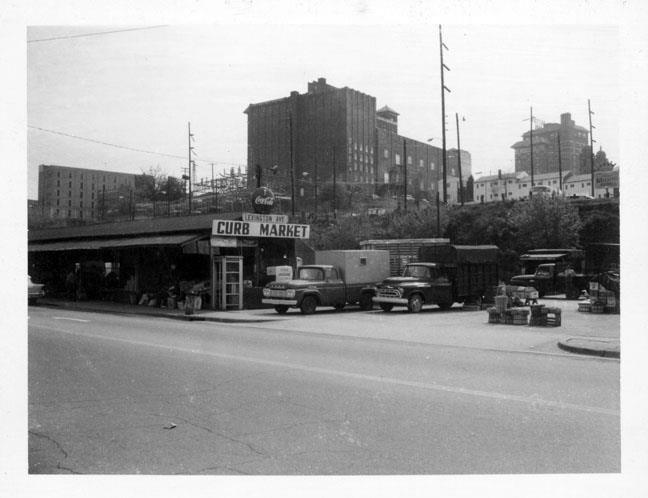
Lexington Avenue Curb Market circa 1969.
Notice in right of photo the Battery Park Hotel and the Heart of Asheville Best Western (light colored building) demolished to make way for the Asheville Civic Center, now known as Harrah’s Cherokee Center – Asheville.
Photo courtesy of Buncombe County Special Collections, Pack Memorial Public Library, Asheville, North Carolina.
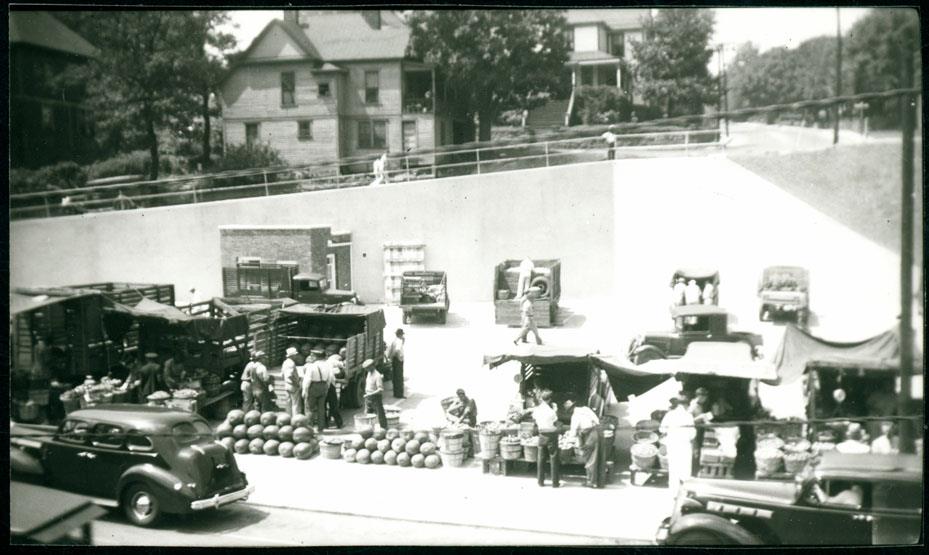
1940s view of the Lexington Avenue Curb Market.
Hiawassee Street runs between the market and the houses in the background (present day Rankin Avenue).
Photo courtesy of Buncombe County Special Collections, Pack Memorial Public Library, Asheville, North Carolina.
1979
April 27 – Celebrating a decade of local impact, Extension employees, volunteers, and program assistants mark the 10th anniversary of EFNEP in Buncombe County. A component of N.C. Cooperative Extension, the Expanded Food and Nutrition Education Program began in 1969 with the mission to help low income families with children improve their skills and knowledge in nutrition.
Today, EFNEP continues this mission by promoting adult and youth nutrition classes for Buncombe County citizens through the work of our current EFNEP educator Amanda Bremseth.
The 1970s proved to be a decade of change for many Americans. As the calendar turned to the 1980s, more changes were in sight. Commodity prices, interest rates, and changes in the economy under a new presidential administration led to uncertainty for many farmers. The number of farms declined as educational opportunities expanded, leading many down a different career path than the generations before them.
Check back in August as we explore the changes and events of agriculture and of Buncombe County Cooperative Extension during the 1980s.
Follow us all year long as we explore each decade of North Carolina Cooperative Extension work in Buncombe County:
Buncombe County Cooperative Extension: Beginnings to 1920
Buncombe County Cooperative Extension: The 1920s
Buncombe County Cooperative Extension: The 1930s
Buncombe County Cooperative Extension: The 1940s
Buncombe County Cooperative Extension : The 1950s
Buncombe County Cooperative Extension : The 1960s
Sources:
“50th Anniversary.” The Asheville Citizen, 23 Oct. 1970, p. 6, Accessed 25 June 2025.
“Buncombe Extension Unit Wins Performance Award .” The Asheville Citizen, 20 Mar. 1972, p. 11, Accessed 25 June 2025.
“Buncombe Farmers Urged to Use Property Tax Break.” The Asheville Citizen, 2 Feb. 1976, p. 14, Accessed 25 June 2025.
Coulter, Adam. “Avery’s Creek United Methodist Church – Celebrating 150 Years.” Unpublished. 2019.
Currie, Carole. “Group Celebrates Birthday.” The Asheville Times, 27 Apr. 1979, p. 6, Accessed 25 June 2025.
“David Burnette Obituary .” The Asheville Citizen Times, 28 Sept. 2006, p. C4, Accessed 25 June 2025.
“Extension Chairman Named .” The Asheville Citizen, 18 July 1975, p. 14, Accessed 25 June 2025.
“Growers Voice Support for Area Farmer’s Market.” The Asheville Citizen, 23 Jan. 1974, p. 21, Accessed 25 June 2025.
“He Has Made Farming Better.” The Asheville Citizen, p. 4, Accessed 25 June 2025.
“Key Moments in Asheville’s Black History.” The Asheville Citizen Times, 22 Feb. 2006, p. B3, Accessed 25 June 2025.
Luedtke, Peggy. “Agencies Move to Center.” The Asheville Times, 28 Mar. 1975, pp. 1–6, Accessed 25 June 2025.
Luedtke, Peggy. “Allen High School Closing Doors After 87 Years .” The Asheville Times, 22 May 1974, p. 17, Accessed 25 June 2025.
Manikowski, Amy C. “Nina Simone’s High School.” Asheville Historic Inns, 27 Feb. 2020, ashevillehistoricinns.wordpress.com/2017/10/28/nina-simones-high-school
March, Chuck. “Agricultural Service Moves.” The Asheville Citizen Times, 9 Jan. 1977, p. 53.
Mitchell, Charles, and Ginny Moore. “What Is Farm-City Week?” N.C. Cooperative Extension News, 23 Oct. 2023, franklin.ces.ncsu.edu/2023/10/what-is-farm-city-week/.
“New Gardening Service Available.” The Asheville Citizen, 24 May 1976, p. 15, Accessed 25 May 2025.
Palmer, W. Riley. “Ag Expert Palmer Retires On July 1 After 36 Years.” The Asheville Citizen Times, 3 June 1973, p. 18, Accessed 25 June 2025.
Palmer, W. Riley. “Buncombe Has Over 200,000 Acres In Farm Tracts.” The Asheville Citizen Times, 25 Oct. 1970, p. 8H, Accessed 25 June 2025.
Palmer, W. Riley. “Extension Notes.” The Asheville Times, 5 June 1972, p. 11, Accessed 25 June 2025.
Palmer, W. Riley. “It Was a Very Good Year for Buncombe Farmers.” The Asheville Citizen Times, 31 Oct. 1971, Accessed 25 June 2025.
Reasoner, Stuart. “Biltmore Estate Tract Bought for WNC Market.” The Asheville Times, 2 July 1975, p. 1, Accessed 25 June 2025.
Reasoner, Stuart. “Extension Post Goes to Burnette.” The Asheville Times, 16 July 1975, p. 1, Accessed 25 June 2025.
“Retirement Dinner Honors Mrs. Mary Cole.” The Asheville Times, 19 July 1974, p. 7, Accessed 25 June 2025.
Yelton, Rose. “Hard Work Is Her Hobby.” The Asheville Citizen, 19 July 1974, p. 7, Accessed 25 June 2025.





